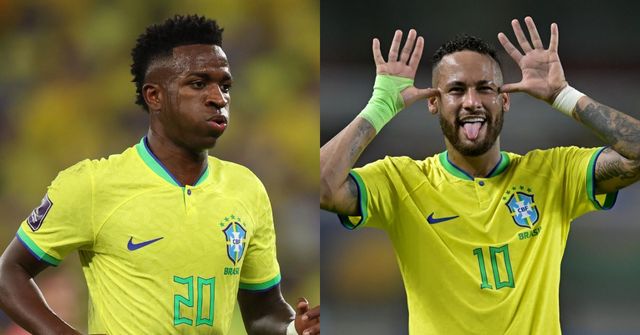Brazil’s World Cup qualifying campaign hit a significant stumbling block as they were held to a 1-1 draw by Venezuela at the Estadio Monumental de Maturin. The Real Madrid star’s penalty miss proved costly on a night where the Selecao’s attacking prowess failed to translate into victory, despite Raphinha’s spectacular free-kick opener.
The match highlighted the growing concerns surrounding Vinicius Jr’s form in the national team colors, with his record of just five goals in five years for Brazil becoming an increasingly worrying statistic. The Ballon d’Or runner-up, who has been brilliant for Real Madrid, continues to struggle to replicate his club form on the international stage, and Thursday’s performance only amplified these concerns.
The evening began with promise for Brazil as they dominated the early exchanges. Raphinha, who would later emerge as the team’s brightest spark, had an early opportunity created by Vinicius’s cutback but sent his effort sailing over the crossbar. The Leeds United winger would make amends in spectacular fashion, however, curling a magnificent 25-yard free-kick in off the post to give Brazil the lead, leaving Venezuela goalkeeper Rafael Romo helpless.
But Venezuela, showing remarkable resilience, weathered the initial Brazilian storm and found their equalizer early in the second half through Telasco Segovia, who thundered home a stunning strike from the edge of the box. The goal exposed defensive frailties in Brazil’s backline, with both Marquinhos and Vanderson coming under scrutiny for their positioning and defensive awareness.
The pivotal moment of the match came around the hour mark when Brazil was awarded a penalty, presenting Vinicius Jr with a golden opportunity to restore his team’s lead and potentially silence his critics. However, in a sequence that seemed to encapsulate his recent international struggles, the Real Madrid forward not only missed the spot-kick but also scuffed the rebound, leading to visible frustration as he threw his arms up in despair.
Under the guidance of manager Dorival Junior, Brazil’s performance raised questions about their tactical approach and team selection. The decision to start Igor Jesus as the target man, while leaving the promising Endrick on the bench, particularly drew criticism. Jesus’s movements often seemed misaligned with his teammates’ expectations, contributing to Brazil’s offensive inefficiencies.
In midfield, the partnership of Gerson and Bruno Guimaraes showed both promise and limitations. While Gerson imposed himself well in central areas and demonstrated good ball-winning abilities, his deliberate pace in moving the ball forward often slowed Brazil’s transitions. Guimaraes, though excellent in his defensive duties, struggled to provide the creative spark that Brazil desperately needed in crucial moments.
The bright spot for Brazil came in the form of Raphinha, who earned an impressive 8/10 rating for his performance. Beyond his wonderful free-kick goal, the winger proved to be a constant threat on the counter-attack, offering the kind of direct running and purposeful play that seemed lacking in other areas of Brazil’s attack.
Defensively, Brazil’s showing was mixed. While Gabriel put in a solid performance, winning his aerial duels and maintaining composure in possession, the rest of the backline showed vulnerabilities. Marquinhos, in particular, had a difficult evening dealing with Salomon Rondon’s physical presence and was criticized for not closing down Segovia quickly enough for Venezuela’s equalizer.
The introduction of substitutes Lucas Paqueta, Luis Henrique, and Gabriel Martinelli failed to change the game’s dynamics, with none making a significant impact. Martinelli, especially, found himself deployed in unusually deep positions, limiting his ability to influence the attack.
This result puts additional pressure on Dorival Junior, whose team selection and tactical decisions are under increasing scrutiny. While he cannot be held entirely responsible for Vinicius Jr’s individual struggles, the overall performance and result suggest that Brazil’s transition period under his leadership may be more challenging than initially anticipated.
The draw serves as a wake-up call for Brazil as they prepare for their upcoming clash with Uruguay. Questions about Vinicius Jr’s role in the national team setup, the balance of the midfield, and the overall attacking strategy will need to be addressed if the Selecao are to maintain their traditionally high standards in World Cup qualifying.
For Vinicius Jr personally, this match represents another setback in his quest to translate his club form to the international stage. The contrast between his dynamic performances for Real Madrid and his struggles with Brazil continues to be a puzzling aspect of his career, one that both player and coaching staff must work to resolve as Brazil progresses through their World Cup qualifying campaign.




